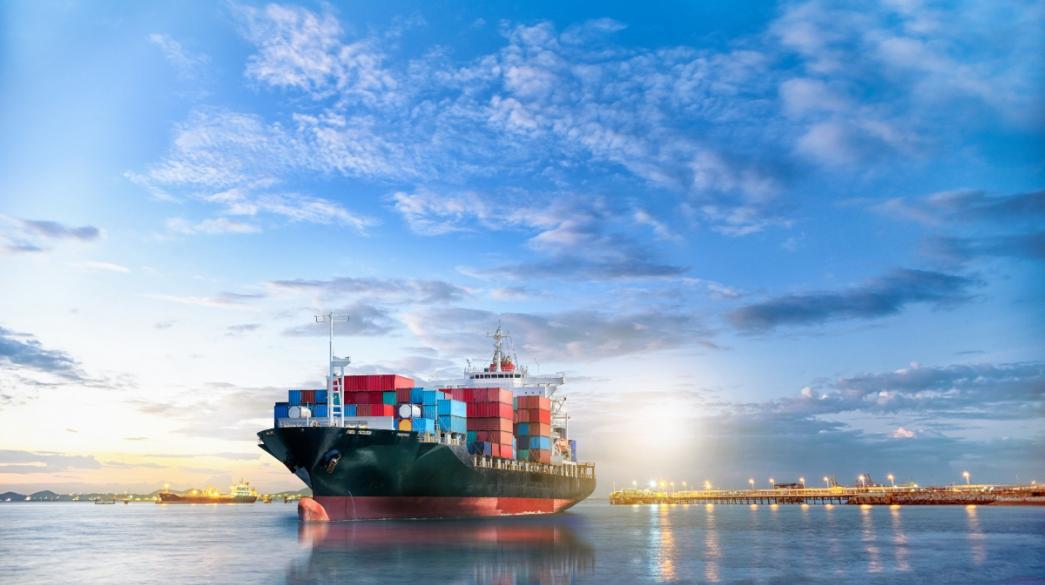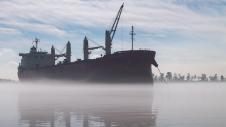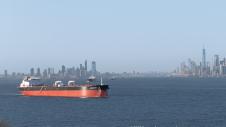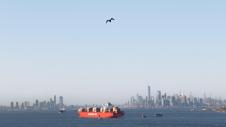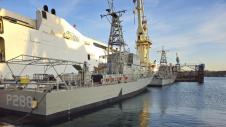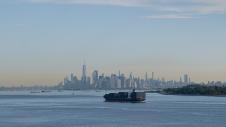A year ago, the hottest topic in the shipping industry was the implementation of IMO 2020 and the dilemma of opting for scrubbers vs just paying up for Very Low Sulphur Fuel (VLSF) oil. Little did we know then!
Honestly, this time last year too, there were early news out of China of a new virus that had caused deaths and hysteria in the remote province of Wuhan, but quite frankly, most people in the West assumed that it was a new case of the SARS virus that would stay more-or-less contained in the Asian continent and let the world go about its business as usual. We did know very little, indeed, then!
A year later, we live in a reality that never has been experienced before in the human race., the Spanish Flu of 1918 notwithstanding. Mandatory lockdowns have been part of the norm worldwide for more than a year now, and then, just when a COVID 19 vaccine offered a ray of hope for a more normalized lifestyle by late 2021, the medical community recently has been drawing attention to new variants of the virus, that potentially can throw off-track an incipient recovery through broad vaccinations.
While we all are fervently hoping that COVID 19 will be under control soon, for our own sake, literally, having lived for a year now under the COVID 19 reality, there has been enough information to draw preliminary conclusions in a new reality that has been formed by this global pandemic.
2020 has been a widely volatile year for ocean freight rates, as shipment for both raw materials and commodities and also for consumer products collapsed, and so did dry bulk and containership freight rates. Tankers fared much better initially, not because of demand, but because of lack of demand, as oil companies and refineries were unexpectedly found with too much inventory at hand and the need for a place to store it, and floating tankers were as good as any storage. The cruise-ship market has been decimated as no-sail orders were implemented internationally, and the offshore drilling market dig itself further down into a depression on the back of a precipitous drop in oil pricing. By the beginning of 2021, the prospects of the maritime industry have aligned with new trends and lifestyles, as demand for raw material has increased—which has increased dry bulk freight rates, and saw tanker rates to levels reflecting fundamentally weak-ish demand (and not demand due to storage). The cruise-ship and offshore markets have not seen an iota of improvement in terms of revenue and prospects, but hopes are still strong for a V-shaped recovery, eventually. The biggest surprise, however, for the industry has been the containership sector, which after years of burning cash and seen its monstrously huge containerships plowing the world’s oceans at half-capacity, has recovered the excitement long lost a decade ago. As one may have expected, demand for containership transport has declined in 2020 sequentially over the prior year, but the containership market is currently white hot mostly on broader factors brought about by the pandemic.
From the “fake” rally of the tanker market last year (due to storage and not due to fundamental demand) to the present rally in the containership market, one can discern canaries in the coal mine of the things and market to come: lifestyles have changed due to COVID19 and established lines of thinking have been shaken (whether on a personal, social or business level); these new trends—which mostly have been evident with the containership market—likely to have a staying power longer than COVID19 and the pandemic.
- Seafarers have been a critical group of the workforce that was left alone to cope with closed border policies due to COVID19; it almost has been allowed to evolve into a humanitarian crisis, showing the failure of our societies and governments to stand up to those communities and essential workers to ensure that the shelves of the department stores and online delivery warehouses were fully stocked. Publicity of the seafarer crisis may have not been as effective as one may have wished in the short term into shaming parties involved into a solution, but the shipping industry must be prepared for increased regulatory scrutiny going forward. The next time the Amazons and the Walmarts and the Shells of the world will look into fulfilling their shipping needs, they will be taking a more holistic view of their shipping requirements and all externalities and the cost for such externalities whether in monetary terms or reputational costs and more.
- Not that the Amazons and Walmarts and Shells of the world do not genuinely care about the welfare of the people and business practices of their supply chains; however, as the COVID19 pandemic has served as an eye-opener for many unfair practices and policies that have gone neglected till now, alarmed and better engaged citizenry (and especially the younger generation) have been putting more pressure on big companies to pay attention to more than just their bottom lines, and ensure that, among other things, that their partners and vendors too are kept to higher standards. Thus, the shipping industry is not viewed as an isolated function that can be outsourced unquestionably, and shipping companies will feel the pain sooner or later in this respect from their big customers (charterers), who, in turn, will be driven by new consumer demands for higher business standards.
- COVID19—along with pressure by a more engagedconsumer class—has made social causes ranging from emissions and pollution to pay equality and fair global taxation (broadly grouped under “ESG” Environmental-Social-Governance) a higher priority than they were even a year ago. We have visible evidence now that the human race has grossly encroaching on nature to the extent that our very own existence can be threatened (even from lowly causes like bats); crying voices for the risk of global warming, rising seas, etc have more substance now. There have been several efforts to mitigate such risks (starting from Poseidon Principles, onwards), and some even assume this fad shall pass too. Perhaps “green washing” may not be much better than “white washing”, but likely the shipping industry is about to enter a “washing” cycle whereby many practices will be called to change, and at a cost to the bottom line.
- As Working-from-Home (WFH) has accelerated existing technology platforms for online co-operation, likewise technologies for operating and managing ships remotely have received an unexpected boost at the age of COVID19; these trends are not just an acceleration of the digitization and digitalization efforts already in progress, but genuine efforts to simplify and automate processes and bring ocean-going shipping closer to line and more interconnected with more advanced form of intermodal transport at the time of the “delivery service” economy.
- The trade wars that were initiated by the Trump administration and the current long lines of containerships (more than 50 post-panamax waiting in queue at California ports by a recent count) have catalyzed re-evaluating the wisdom of the current global supply chain networks and some of their key concepts that seemed sacrosanct a few months ago (i.e. Just-In-Time Inventory, etc) Running lean supply chains may have certain financial benefits, but in a world of port terminal slowdowns, crew change prohibitions, rapidly shifting costumer tastes, etc, running supply chains with fatter inventories may be the new norm; even more, the trends of re-shoring and near-shoring (as opposed to off-shoring) have more potential in an effort to support local economies devastated by COVID19 and try to arrest certain larger trends (import and anti-immigrant backlash, rise of nationalism) etc The fact that the Biden administration has not exactly rushed to remove tariffs against Chinese imports to the US can be considered a hint that there will be a preference to stimulate local production.
- Lastly, as stigmatized as Working-from-Home (WFH) had been pre-COVID19, at present it’s a mandatory requirement and accepted business practice; with new technology platforms making inroads at keeping office colleagues together, it would be hard to see office work with mass commuting coming back at full scale (that entails to demand for gasoline and petroleum products). There will be structural shift of demand for more cargoes and products and services, which definitely will be lining new trends for the shipping industry in the future.
They say that a crisis is a great thing to let go to waste. The COVID19 pandemic definitely has been a bigger crisis that humankind was prepared to bargain for (as we stand profoundly saddened at the human loss and human suffering inflicted by COVID19); nevertheless, one has to be encouraged from the lessons, and the trends that seem to be emerging as we face this medical crisis ib the last year. It’s unfortunate that sometimes it takes a global pandemic to push the world (and industries like shipping) to a new age.
Basil Karatzas is the Founder and CEO of Karatzas Marine Advisors, a shipping finance and shipbrokerage firm based in New York. Basil is an Accredited Senior Appraiser and Fellow of the Institute of Chartered Shipbrokers. More info on Basil and the firm can be found at www.karatzas.com


